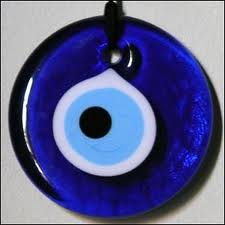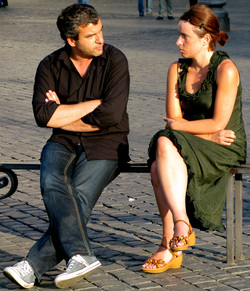
Many cultures believe in the evil eye
(1-4) Some people will take out their own eye to see someone else go blind. Hay quien se saca un ojo para ver a otro ciego.
This proverb offers a powerful visual image of a vengeful and self-destructive person. It reminds us that when we want to see another person suffer, we often end up hurting outselves in the process. How much are we willing to sacrifice and suffer to see our enemy fall? Have we lost perspective? What are we doing to ourselves when we spend our time and energy trying to harm someone else? Clearly, relationships between human beings can't always be peaceful, but Ocana reminds us to keep our anger and aggression in check. Otherwise, we'll pay a price for our actions.
In iré (good fortune), Ocana talks about a person with great leadership abilities, a hard working person with good planning skills and a talent for analysis and organization. But, when this individual falls into osorbo (bad fortune), he becomes vindictive. He would rather destroy everything he's created with his own hands instead of let someone else enjoy it. He has a hard time admitting he's wrong, and he'll fight to the bitter end to have his own way. When crossed, he becomes a fierce enemy and won't rest until he sees his enemies brought down. His bad temper and hot head can cause serious health problems, especially if he becomes so obsessed with an issue that he can't let it go. He doesn't like other people to know he's suffering, so he hides his own pain, letting it fester until it erupts in violent ways. The result of so much bad feeling directed toward another person is what many cultures call "the evil eye," an intense desire to see someone else fail.
This proverb offers a powerful visual image of a vengeful and self-destructive person. It reminds us that when we want to see another person suffer, we often end up hurting outselves in the process. How much are we willing to sacrifice and suffer to see our enemy fall? Have we lost perspective? What are we doing to ourselves when we spend our time and energy trying to harm someone else? Clearly, relationships between human beings can't always be peaceful, but Ocana reminds us to keep our anger and aggression in check. Otherwise, we'll pay a price for our actions.
In iré (good fortune), Ocana talks about a person with great leadership abilities, a hard working person with good planning skills and a talent for analysis and organization. But, when this individual falls into osorbo (bad fortune), he becomes vindictive. He would rather destroy everything he's created with his own hands instead of let someone else enjoy it. He has a hard time admitting he's wrong, and he'll fight to the bitter end to have his own way. When crossed, he becomes a fierce enemy and won't rest until he sees his enemies brought down. His bad temper and hot head can cause serious health problems, especially if he becomes so obsessed with an issue that he can't let it go. He doesn't like other people to know he's suffering, so he hides his own pain, letting it fester until it erupts in violent ways. The result of so much bad feeling directed toward another person is what many cultures call "the evil eye," an intense desire to see someone else fail.

Our behavior defines us in the eyes of others
Ocana (1) combined with Iroso (4) calls attention to the eyes. It's important that we see what's going on around us, that we pay attention to what's in front of our eyes, and that we know how to interpret it correctly. Things aren't always what they appear to be on the surface; they call for deeper analysis. We need to use the sharp intelligence of Ocana to investigate and think through the meaning of what we're seeing. It's also important to pay attention to the image that other people have of us. People watch us to see what we do and how we react in difficult situations. Our reputation depends on keeping a cool head and acting with a certain amount of decorum in public settings. If we have conflicts with people at work, in the family, or among our friends, the loss of emotional control in front of other people will cause them to think badly of us, even when we're in the right. We don't have to physically assault someone to show the world we're acting like a bully. Any time we try to strip another person of their dignity, lower the opinion other people have of them, take something away from them, or cause them to suffer by our words or actions, it reflects back on us. People don't like bullies. We might tear out the eye of an enemy and leave him half-blind but, in the process, we've seriously damaged the image others have of us through our violent and rash behavior.
Ocana teaches us that the sweetness of life wouldn't have any meaning without some bitterness. It's not reasonable to think that we can go through life without having some conflicts. But, sometimes it's better to walk away from the conflict and not give it further thought rather than to let it bog us down. If others have wronged us, what do we gain by dragging out the conflict with an endless war? Each act of hostility and aggression produces a similar response, until eventually we're spending more time plotting against our enemy than we spend taking care of ourselves or showing affection toward people we love. This proverbs reminds us that we should put our own well-being first, and not sacrifice our peace of mind just to see other people get the payback they deserve. At the end of the day, it's simply not worth it.
Ocana teaches us that the sweetness of life wouldn't have any meaning without some bitterness. It's not reasonable to think that we can go through life without having some conflicts. But, sometimes it's better to walk away from the conflict and not give it further thought rather than to let it bog us down. If others have wronged us, what do we gain by dragging out the conflict with an endless war? Each act of hostility and aggression produces a similar response, until eventually we're spending more time plotting against our enemy than we spend taking care of ourselves or showing affection toward people we love. This proverbs reminds us that we should put our own well-being first, and not sacrifice our peace of mind just to see other people get the payback they deserve. At the end of the day, it's simply not worth it.
 RSS Feed
RSS Feed
